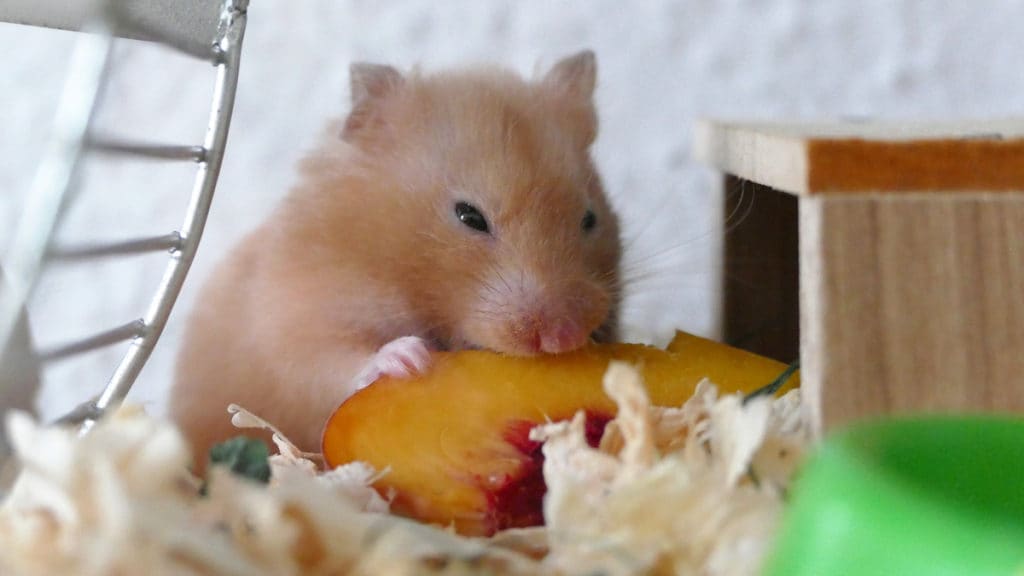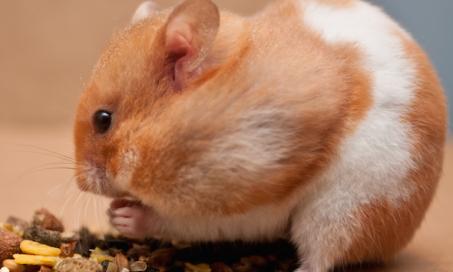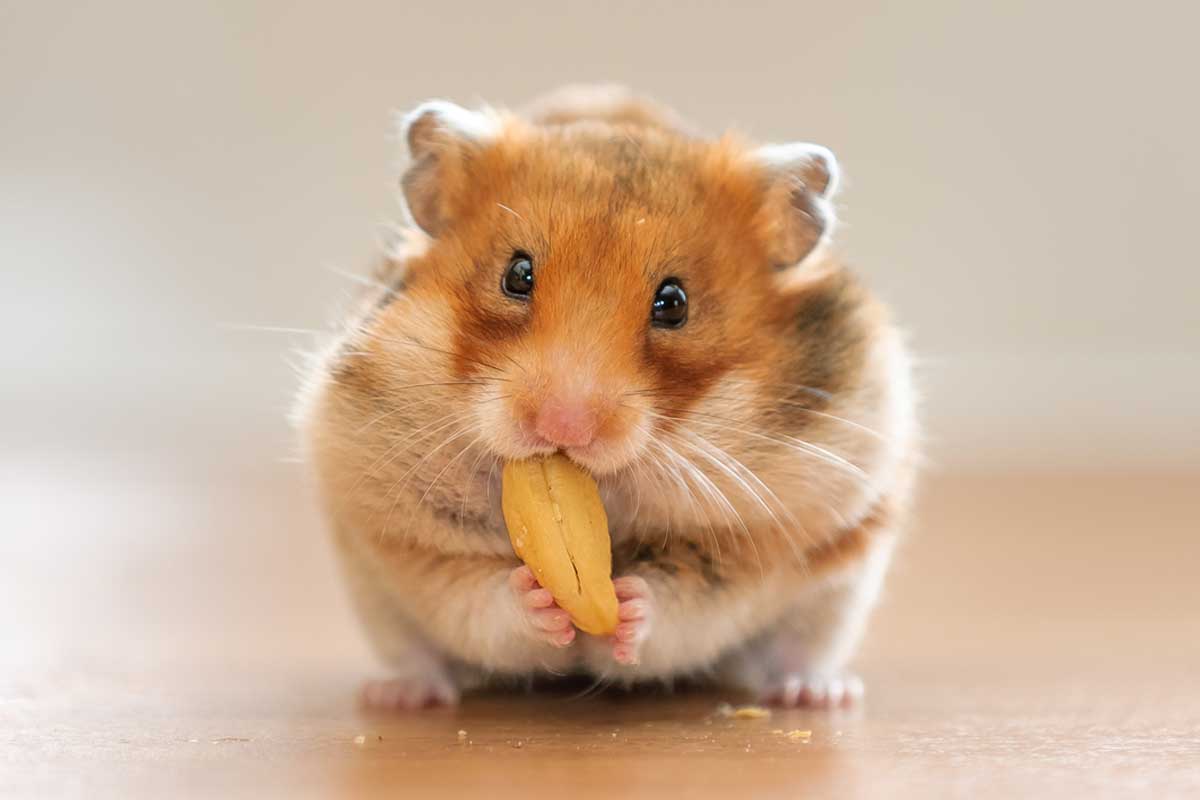Did you know that hamsters love fruits and vegetables as much as we do? Providing them with a balanced diet that includes a variety of fresh produce can boost their health and happiness. In this blog post, we’ll share some of the best fruits and veggies to feed your furry friend. Get ready to be amazed by the variety of options available!

1. Top Fruits that Hamsters Love
When it comes to fruits, hamsters have sweet teeth too! Apples, pears, strawberries, blueberries, grapes, and bananas are some of their favorite fruits. However, it’s important to offer them in moderation as a supplement to their regular diet of pellets and seeds. Feeding too much fruit can lead to weight gain and digestive issues. But don’t worry, offering your hamster a small amount of fruit once or twice a week can be a great way to add variety to their diet and keep them happy. Remember to always wash the fruit before feeding it to your furry friend.
2. How to Offer Fruits in Moderation to Hamsters
Hamsters love fruits, but it is important to offer them in moderation to maintain a balanced diet. When offering fruits to hamsters, it should be a supplement to a pellet-based diet. Fresh fruits should be washed thoroughly before offering them to hamsters. Dried fruits and vegetables should be avoided as they have higher sugar content. One can mix a variety of fruits like apples, blueberries, pears, strawberries, and bananas in hamsters’ food. It is essential to remove any uneaten food from the hamsters’ habitat daily to prevent spoilage and bacterial growth. By following these simple steps, one can ensure that their hamsters have a healthy and balanced diet.

3. Fresh Vegetables and Fruits: A Must-have in Hamster’s Diet
Fresh vegetables and fruits should be a part of every hamster’s diet. They not only provide the necessary vitamins and minerals a hamster needs, but they also offer extra hydration that is crucial for their health. As mentioned earlier, serving fruit in moderation is advised, as high sugar content can lead to health issues like diabetes. It’s best to stick with offering vegetables as the primary ingredient in their diet. By incorporating a variety of fresh veggies, hamsters can enjoy a well-rounded diet that promotes a healthy lifestyle. It’s essential to keep in mind the right ratio of seeds and pellets in their diet too.
Allowing them to have a balanced diet not only keeps them full but also provides essential nutrients that will keep them happy and healthy. Supplementary foods like high-protein snacks and sugarless breakfast cereals are another way to ensure hamsters receive a well-rounded diet. Lastly, it’s important to clean out their habitat and remove uneaten food daily. This ensures a clean environment and a healthier lifestyle for your pet hamster.
4. The Right Ratio of Pellets and Seeds in Hamster’s Diet
Hamsters require a balanced diet that includes different types of food, but it’s essential to maintain the right ratio of pellets and seeds. These small critters must digest 15-25% protein, 35-40% carbohydrates, and 4-5% fat, which can be achieved by feeding one tablespoon of hamster food pellets each day. It’s important not to exceed 5% of hamster pellets as they can cause obesity and health problems. Instead, offer a variety of seeds, grains, and nuts to fulfill their dietary needs. A natural mix may be a great option if it contains the proper percentage of each nutrient.
Hamster owners should also pay attention to the vegetables and fruits they offer as they are not the main part of their diet. Moderation is key when adding these foods to their routine. Offering a well-balanced diet will help hamsters live happy and healthy lives.

5. Sugarless Breakfast Cereals or Grains: Hamsters’ Favorite
Hamsters love to munch on sugarless breakfast cereals and grains, making them a favorite addition to their diet. Some suitable cereals include Rice Krispies, Weetabix, Shreddies, Cheerios, Cornflakes, All-Bran, and Chex. It is very important to check the ingredients to ensure that the cereal is sugar-free and made from natural sources. Muesli and other cereals that are made with grains should be avoided as they often contain added sugar and dried fruits.
Hamsters also enjoy whole grains in the form of cooked pasta, cooked rice, and bits of whole-grain toast. Providing hamsters with a balanced diet consisting of fresh fruits and vegetables, pellets, and seeds will help them lead healthy and happy life.

6. Colorful Vegetables that are Hamsters’ Favorite
Hamsters love colorful vegetables just as much as they enjoy leafy greens. In fact, brightly colored veggies like squash and carrots are some of their favorites. Carrots are not only nutritious, but they also help keep their teeth healthy and clean. Bell peppers are another colorful vegetable that hamsters enjoy, and they’re a great source of Vitamin C. Other veggies that you can add to your hamster’s diet include broccoli, sweet potato, and zucchini. Remember to offer fresh vegetables in moderation, as too much can cause digestive problems. It’s important to provide a balanced diet that includes a variety of foods, so your furry friend receives all the nutrients they need to thrive.

7. Safe Fruits List for Hamsters
Hamsters have a sweet tooth, and fruits are a tasty treat to offer them. However, not all fruits are safe for your furry friend. This is why it is crucial to know the safe fruit list for hamsters. Elderberries, raspberries, figs, starfruit, gooseberries, strawberries, grapes without seeds, tomatoes, guava, and watermelon are suitable options to offer. While feeding fruits to hamsters, it’s essential to ensure moderation and balance in their diet. Fruits should be offered as a supplement, not the primary source of nutrition. Always remove any uneaten food to avoid bacteria growth and clean the habitat regularly. Your hamster will love the variety of safe fruits in their diet.
8. Washing Fruits and Vegetables before Feeding Hamsters
When it comes to feeding your hamster fresh fruits and vegetables, it is important to remember to always wash them first. This will help to remove any dirt or pesticides that may be harmful to your pet. Additionally, washing fruits and vegetables can also help to remove any bacteria or germs that may be present. To ensure that your hamster stays healthy and happy, it is important to always offer them clean, fresh foods. By taking the time to properly wash your fruits and vegetables before feeding them to your hamster, you can help to ensure that they remain healthy and free from illness.

9. Removing Uneaten Food from Hamster’s Habitat Daily
It’s important to remove any uneaten food from a hamster’s habitat daily. This ensures that the food doesn’t rot and becomes a breeding ground for harmful bacteria that could be harmful to your furry friend. Not only that, but it also helps to keep the habitat clean and smelling fresh. Hamsters can be picky eaters, and they may not like certain types of foods or even certain parts of a certain food. By removing any uneaten food, you can get a better idea of what your hamster likes to eat and adjust their diet accordingly.
Plus, it helps to reduce waste and saves you money in the long run. Overall, removing uneaten food from a hamster’s habitat daily is an essential part of caring for your furry friend and ensuring they stay healthy and happy.

10. Foods to Avoid Feeding Hamsters; A Cautionary Tale
When it comes to feeding hamsters, it’s important to know what foods to avoid. Some human foods, like chocolate, caffeine, and alcohol, are toxic to hamsters and can even be fatal. Additionally, certain fruits and veggies, like onion, garlic, rhubarb, and raw potato, contain harmful toxins that can make your furry friend sick. Hamsters also shouldn’t be fed too many high-fat foods, like nuts and seeds, as they can lead to obesity and health problems.
Instead, stick to a balanced diet of fresh fruits and veggies, pellets, and grains to keep your hamster healthy and happy. Always consult with a veterinarian if you’re unsure about what foods are safe for your hamster to eat.
- From Whiffs To Winks: Decoding Hamster Euphemisms And Odors - April 12, 2024
- Fit And Fabulous: The Importance Of Exercise For Your Hamster’s Health - April 12, 2024
- Farewell, My Furry Friend: Honoring Your Hamster’s Life And Legacy - April 12, 2024


